
Roger Federer: Simply incredible
‘I want to give myself the best chance to play as long as I can. Maybe then it will become clear that it is time to stop. You know things change very quickly, and you have to be ready and open about it.’
By now, Roger Federer must not get surprised at the sound of the lavishly used ‘R’ word – retirement – brought up cautiously by a correctly-worded question in a post-match conference every time the great man loses to a lower-ranked player. Such was the incredulity of his feats a few years ago, that even today a loss brings frowns to millions of tennis fans and followers around the world, inevitably leaving a lingering question in the air – is this the beginning of the end?

Age is catching up. but the grace still remains
Even though Federer has lost to players out of the top ten a fair few times in the last few years, the loss to world number 16 Kei Nishikori in the early stages of Madrid Open last week must have been particularly disappointing. He admitted to the same after the match, dejected that he could not even force his opponent to play his best to beat him. Federer has opted to skip a few tourneys this year to keep his fitness in check – a strategy designed to increase his longevity, but which could cause him to be rusty in key tournaments. It was rustiness in Madrid, as he floundered one return after another at the beginning of the third set against Nishikori, having just won the second set comfortably, and being two points away from breaking him early in the third. As Federer later put it, there was a fine line between being aggressive and being safe, and it was a balance he could not find.
It is indeed a balance that becomes harder to find with age, and Federer manages to veil his age well. One can still see him moving swiftly and gracefully on the court, suddenly injecting pace into a killer inside-out forehand and finishing with an expert volley that remind us of his youthful reign. We almost forget that he will turn 32 this August, and still has to contend with a group of much younger, ridiculously agile and extremely driven opponents if he has any chance of getting close to another Grand Slam.
However, age has hardly stopped the true greats from glorious wins and comebacks. Pete Sampras surprised them all with a marvellous comeback to win the 2002 US Open following a poor summer in which he got knocked out in the second round of Wimbledon. Jimmy Connors made a famous run into the US Open semi-finals in 1991 at the age of 39, and we can hardly forget Andre Agassi making an improbable run into the US Open Final in 2005 where he was eventually overcome by, well, Roger Federer. That is indeed the constitution of great players that the pundits will never fully understand; their ability to find ways and means to win even when they are not at their best. With no Grand Slam wins for the preceding two-and-a-half years, Roger Federer found a way to win the Wimbledon in 2012 and regained the number one ranking. It will be a long time before Federer can be discounted as a real contender for any Grand Slam.

Roger Federer with the 2012 Wimbledon Trophy
The question, therefore, is not whether Federer can win, but what can still drive him to win. He holds most of the records that matter. From being number one for the longest time, to winning on every surface; from making the most consecutive Grand Slam semi-final appearances, to establishing undeniable supremacy on grass; he has bagged it all. Yes, we may not see him battling in every Grand Slam final henceforth; we may see him lose his rhythm in inexplicable fashion and concede defeats to wildcards. But the man will continue playing; because when he will hit the chord, gliding across the court effortlessly, moving his hands fluently through the ball and striking it with deadly assurance; in those moments of his greatness restored, even the fittest, the grittiest and the most efficient will be left hapless. The crowd will once again applaud in collective worship, and the legend will be engraved deeper into the books of unforgettable history.
Roger Federer is important to tennis. He entices the follower and the agnostic alike to visit the stadiums and spread the fandom of tennis. He is a role model to kids and younger players, and will remain so long after he hangs his boots. The day will come when he will be missing from the player draw. There will be gritty play from Nadal, efficient dominance from Djokovic, and a confident run by Murray. But there will a void that used to be filled by a man who used to play what can only be described as ‘beautiful tennis’.
Let us stop scrutinizing for signs of decline, or wondering about the inevitable day when he calls it a day. Let us only rejoice in every moment of magic we can still squeeze out of arguably the greatest tennis player ever – Roger Federer.